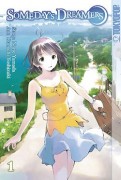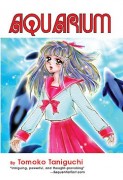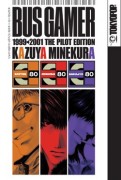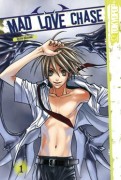In addition to playing a lot of games, I read a ton of manga. 2014 was a packed year as far as trying– and committing to– new manga series goes; as of this writing, I’m currently following nearly twenty different series. There have been loads of great new work being produced lately, as well as old classics I’m either finally catching up on, or reading as they are being published in English for the first time. Perhaps I’ll write about some of those works later, but for now, I’ll focus on a specific class of manga: cheap, short series picked up from Right Stuf’s Bargain Bin and epic year-end sales.
Even when picking up manga on the cheap, I tend to do some basic research beforehand; the length of a given series and its general reception are the two most important factors. The latter’s self-explanatory, but as for the former, I try to stick to series that are only a few volumes long at most. Only once have I ever bought a 10+ volume long series at a nice discount without having read any of it, and fortunately, that manga turned out to be excellent: Ouran High School Host Club, picked up in box set form for 50% off (in all fairness, though, I’d previously seen—and loved—the anime). I do have the seven-volume Lament of the Lamb waiting for me in the wings, but if it wasn’t for some decent ratings and the set being roughly 67% off cover price, I wouldn’t have picked it up.
Anyway, let’s get started.
Someday’s Dreamers
by Norie Yamada and Kumichi Yoshizuki
US Publisher: Tokyopop
Total Volumes: 2
Original Cover Price: $19.98 for both
Bought For: $11.98 (reduced to $10.78 with Got Anime) for both
I’ll start with a short series I picked up in May of last year, Someday’s Dreamers. Like most of the books featured in this post, this was localized by Tokyopop, which abruptly shut down its North American publishing operations in 2011. Without going into that too deeply, this move caused quite a stir in the manga blogosphere and led to Tokyopop books being clearanced out of Barnes & Noble. Since Right Stuf’s Bargain Bin includes a lot of items returned to publishers by other stores, that’s probably what accounts for the large amount of Tokyopop stuff it holds. That said, the condition of these Bargain Bin books ranges from “used bookstore” to “practically new”, but either way, it’s hard to tell if I truly got my money’s worth without actually reading them.
Upon rereading Someday’s Dreamers, I confirmed that in this case, I had. This manga, in which magic is a normal thing in contemporary Japan, is about a seventeen year old girl, Yume, who spends a summer in Tokyo for magic-user training and certification. Her everyday adventures, tinged as they are with magic, reveal her to be extremely empathic and wanting to do the right thing, but, at least at first, without much serious thought put into the potential consequences of her actions. Her biggest hurdles come in the form of lessons about life, death, and happiness, and, on top of that, her teacher has issues of his own.
The art style, along with Yume’s personality and the slice-of-life nature of the chapters, are unabashedly moe, in a good way. Yume definitely fits the moe mold: she’s a sweet, kind girl who you want to be happy, and has the small mouth, smaller nose, and gentle-yet-somewhat-sad eyes endemic amongst this subgenre’s characters. Aside from some mild and occassional emphasis on certain body parts in the art and composition, there is nothing creepy here, just a coming-of-age story about a teenager who also happens to know some magic. Like the best works of this type, it’s pleasant and rather nostalgic, and the premise enables some particularly dreamlike scenes.
If there is one thing that’s unusual about these two volumes, it is that they are both rather short, each one clocking in at around 130 pages, when your standard manga is typically 50-70 pages longer than that. I wonder why Tokyopop chose to release these two volumes individually, rather than compiling them into an omnibus; it could be because of the way the story arcs are structured, or a restriction imposed by the original creators, or something else. Regardless, it’s a good purchase for $12 (seven bucks for Vol. 1 and five for Vol. 2) if you’re ever in the mood for this sort of thing.
Aquarium
by Tomoko Taniguchi
US Publisher: Central Park Media
Total Volumes: 1
Original Cover Price: $9.99
Bought For: $2.49
As it happens, CPM is another defunct anime and manga company, albeit one who had been around a bit longer and whose business practices were less controversial. They didn’t publish much printed media, but their manga catalog was as diverse as their anime one. In addition to works such as the notorious hentai Urotsukidoji, series by Kia Asamiya and Youka Nitta, various anime adaptations, and even some manhwa and OEL stuff, they published a handful of one-shots and two volume manga by Tomoko Taniguchi, including the short story collection Aquarium.
There are three stories in the book. In “Aquarium”, a high school student drowns her sorrows by gazing at the fish at a local aquarium; “The Flying Stewardess” is about a young flight attendant trying to fit in at her lively job; and finally, “The Heart is Your Kingdom” concerns a girl who has trouble smiling around the boy she likes.
There isn’t much about these stories that I could find fault with. The pacing is appropriate to each one and the page layouts convey the tales with clarity. It’s also nice that the second story was lighthearted and comedic, serving as a nice break between the drama of “Aquarium” and that of “The Heart is Your Kingdom”. Despite the brief time spent with the characters, they are realistic, and their stories are heartfelt, if a bit melodramatic at times.
If there’s one thing I would warn potential readers about, it’s that this is most definitely an early 90s shoujo manga. The art style is old-fashioned by today’s standards, which may be a bit of a turnoff to some people. If you can get past that hurdle, it’s definitely worth the four dollars that it’s now going for at Right Stuf. Aquarium made such an impression on me that I now have a handful of other short works by this mangaka on order. Here’s hoping that they are just as good.
Bus Gamer
by Kazuya Minekura
US Publisher: Tokyopop
Total Volumes: 1
Original Cover Price: $9.99
Bought For: $2.99
Three young men are caught up in a dangerous game, one in which we might call “tower defense”. The “towers” are corporate secrets on floppy disks, and they must be either guarded or taken away from a competing team. These three are “Business Gamers”, and they play for huge monetary rewards and the amusement of the rich assholes who are their bosses. However, this game becomes more dangerous with each new round, and increasingly difficult to leave.
This “Pilot Edition” of Bus Gamer is all that exists of this series—a series which clearly seems to have been intended to become something longer and more fleshed out. We learn snippets about our heroes’ lives and personalities from chapter to chapter, but many of the biggest questions, such as why they need the money they get from playing this game, go unanswered.
At many times, Bus Gamer is very much a character study, with high school student Kazuo the most earnest of the three; it is he who wants to know more about his partners, with the other two, Toki and Nobuto, only rarely revealing new aspects of themselves. The camaraderie that slowly, gradually, develops between them is the most intriuguing thing about this manga, and a major reason why I wished it had continued.
Bus Gamer‘s art style is detailed, stylized, and imperfect, and a great match for the solid page and panel compositions. The writing has an urban feel to it, with a localization that, thankfully, doesn’t go overboard with the slang. The mangaka is best known for a longer series, Saiyuki, which I’m considering checking out now, even though the setting doesn’t grab me as much. As for Bus Gamer, this one-shot is, like Aquarium, currently $3.99 in Right Stuf’s Bargain Bin and is worth a look if you can tolerate its incompleteness.
Mad Love Chase
by Kazusa Takashima
US Publisher: Tokyopop
Total Volumes: 5
Original Cover Price: $54.95 for all
Bought For: $24.99 for all
Finally, we have come to the bottom of the stack, in more ways than one. I didn’t have the highest expectations for this series, based on its premise, but most people seemed to like it well enough that I figured I should give it a chance. As it turned out, it isn’t bad, but it’s not really good, either. While I wait for the next volumes of truly great romantic comedies My Love Story!! and Nisekoi, please join me in picking apart Mad Love Chase.
Like I said, the premise of this manga didn’t sound like the greatest thing ever, but it did hold some promise. Demon price Kaito runs away from home with his pet cat to avoid his arranged marriage and live freely in our world, disguised as a human. Angered by this, the Demon King sends a team of three agents to find the prince, who can easily be identified by an elaborate tattoo on his back. Hijinks, largely involving the agents trying to remove the prince’s shirt, ensue.
This setup is handled quickly and messily. The earliest chapter is particularly bad, as the setup of the premise feels forcefully rushed, without letting the exposition flow naturally. Things get slightly better later on, though new plot holes arise. For example, somewhere in the middle of the series, a new character and his pet mouse come onto the scene to hunt down the prince, though his motives are never made clear, and, after his story arc is over, he is never seen again and only mentioned in passing once or twice. Another new character, a magician, comes along later on and, although he is actually important to the story, his actions seem too serendipitous to take seriously as plot developments. Then there’s the “love triangle” that permeates the series, and isn’t really a triangle in the traditional sense, if at all. Finally, like the beginning of the manga, the end is rushed and unsatisfying, though it does attempt to tie up all the loose ends for the entire cast.
If there is a high point to this manga, it’s the art, which is very good. Unfortunately, there are many places where it suffers from bad layouts, plus the “gag” art of the characters isn’t all that great. Most of the characters are likable, though the pacing and layouts often work against them. In general, this is a lighthearted, and frequently silly, romp without a whole lot else going for it. Oddly, it isn’t in the Right Stuf Bargain Bin, even though at least a couple of the volumes I got were certainly at that level of condition; it was offered as a bundle during the holiday sales (which is when I picked it up), and again during their recent Valentine’s Day promotion. Even if this series does go on sale again, skip it in favor of an actual good romantic comedy.



